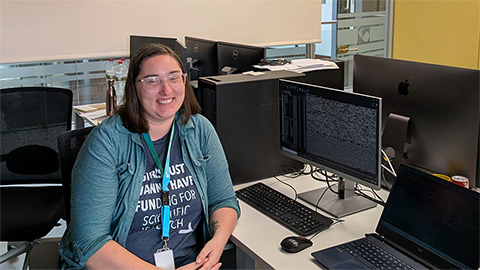A paleolithic peer review
You might think review panels have only been around for the last century or so. You would be mistaken. Archeologists recently discovered the following etched into the wall of a cave deep below the campus of Flintstone University, an R1 research institution.
Research Plan
Midday fatigue is a significant problem affecting the majority of our tribe, reducing our ability to hunt and gather effectively.

Our preliminary studies show that when goats eat the berries of plants in the genus Coffea, they become more energetic.
We hypothesize that coffee berries may be used to brew an energy drink for humans.
Our research plan will involve steeping the grinds from the coffee berry fruit or seed (or placebo) into heated water for 10 minutes. Samples will be blinded and consumed by age-matched participants. Energy levels of participants will be quantified 30 minutes later, assessed by how far each subject can run.
Unfortunately, the proposal was not discussed, delaying the discovery of coffee for many years. Here are the reviews:
Reviewer 1
- The premise is flawed as what happens in goats is not guaranteed to happen in humans.
- The PI has no experience grinding seeds.
- Water source is not specified.
Reviewer 2
- Leaves are already used to brew tea. Proposal lacks innovation.
- It is surprising that the PI did not determine whether goats are more energetic after consuming other foods.
- Only oral dosing is proposed. The PI should include alternate routes of administration.
Reviewer 3
- PI did not ensure that all participants would have equal leg lengths, complicating interpretation of the data.
- What if the alleged effects of coffee berries are not felt until 31 minutes postconsumption?
- Findings will have low impact: It is unlikely that most people would go to this sort of trouble when they could easily take a nap.
Enjoy reading ASBMB Today?
Become a member to receive the print edition four times a year and the digital edition monthly.
Learn moreGet the latest from ASBMB Today
Enter your email address, and we’ll send you a weekly email with recent articles, interviews and more.
Latest in Opinions
Opinions highlights or most popular articles

Women’s health cannot leave rare diseases behind
A physician living with lymphangioleiomyomatosis and a basic scientist explain why patient-driven, trial-ready research is essential to turning momentum into meaningful progress.

Making my spicy brain work for me
Researcher Reid Blanchett reflects on her journey navigating mental health struggles through graduate school. She found a new path in bioinformatics, proving that science can be flexible, forgiving and full of second chances.

The tortoise wins: How slowing down saved my Ph.D.
Graduate student Amy Bounds reflects on how slowing down in the lab not only improved her relationship with work but also made her a more productive scientist.

How pediatric cataracts shaped my scientific journey
Undergraduate student Grace Jones shares how she transformed her childhood cataract diagnosis into a scientific purpose. She explores how biochemistry can bring a clearer vision to others, and how personal history can shape discovery.

Debugging my code and teaching with ChatGPT
AI tools like ChatGPT have changed the way an assistant professor teaches and does research. But, he asserts that real growth still comes from struggle, and educators must help students use AI wisely — as scaffolds, not shortcuts.

AI in the lab: The power of smarter questions
An assistant professor discusses AI's evolution from a buzzword to a trusted research partner. It helps streamline reviews, troubleshoot code, save time and spark ideas, but its success relies on combining AI with expertise and critical thinking.

